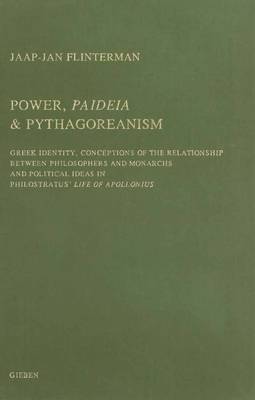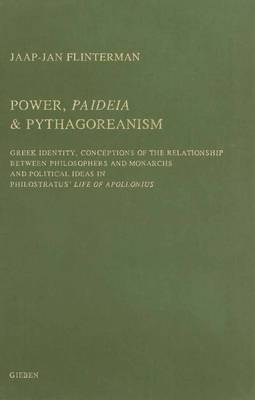
- Afhalen na 1 uur in een winkel met voorraad
- Gratis thuislevering in België vanaf € 30
- Ruim aanbod met 7 miljoen producten
- Afhalen na 1 uur in een winkel met voorraad
- Gratis thuislevering in België vanaf € 30
- Ruim aanbod met 7 miljoen producten
Zoeken
Power, Paideia & Pythagoreanism
Greek Identity, Conceptions of the Relationship Between Philosophers and Monarchs and Political Ideas in Philostratus' Life of Apollonius
Jaap-Jan Flinterman
€ 170,95
+ 341 punten
Omschrijving
The Athenian sophist Philostratus completed a romanticised biography of Apollonius of Tyana in the second or third decade of the third century A.D. One of the most striking aspects of the presentation of this firstcentury Pythagorean sage and miracleworker in the Vita Apollonii (VA) is his role as 'politically active philosopher'. Not only does the protagonist of the VA regularly intervene in situa-tions of conflict in Greek cities and instruct their citi-zens on how they ought to live together, but he also appears in contact with Parthian and Indian kings and Roman emperors. The present study deals with this promi-nent facet of Philostratus' portrait of the Tyanean sage. There are three main issues. The first is the question of the extent to which the Apollonius tradition provided support for the image of the contacts of the protagonist of the VA with cities and monarchs. The second is consideration of how the author dealt with and elaborated these elements in his source material. The third is the question of to what extent the protagonist of the VA may be regarded as a spokesman for the explicit political views of Philostratus. In other words, the aim is to analyse the image of the protagonist of the VA as a 'politically active philosopher' as the result of the interaction between the traditions associated with a sage and miracleworker who was regarded as a representative of Pythagorean wisdom, on the one hand, and the paideia, cultural baggage and mentality of a sophist, on the other.
Specificaties
Betrokkenen
- Auteur(s):
- Uitgeverij:
Inhoud
- Aantal bladzijden:
- 288
- Taal:
- Engels
- Reeks:
- Reeksnummer:
- nr. 13
Eigenschappen
- Productcode (EAN):
- 9789050632362
- Verschijningsdatum:
- 1/01/1995
- Uitvoering:
- Hardcover
- Formaat:
- Genaaid
- Afmetingen:
- 163 mm x 244 mm
- Gewicht:
- 703 g

Alleen bij Standaard Boekhandel
+ 341 punten op je klantenkaart van Standaard Boekhandel
Beoordelingen
We publiceren alleen reviews die voldoen aan de voorwaarden voor reviews. Bekijk onze voorwaarden voor reviews.








